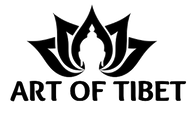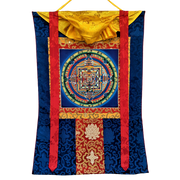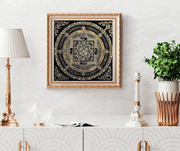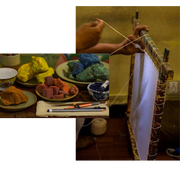Wheel Of Life Masterpiece Thangka
EASTER SALE
Get it between - .

Wheel of Life Thangka – The Cycle of Existence and Liberation
This Tibetan Wheel of Life Thangka is a profound representation of the Buddhist philosophy, perfect for both home décor and meditation spaces. This 100% hand-drawn Thangka painting, created in the Kathmandu Valley of Nepal, embodies the cycle of existence, illustrating the path from suffering to enlightenment. It can serve as a centerpiece in your home or office, or as a powerful tool for spiritual healing and meditation when placed on your family altar. Embrace the benevolent energy of Tibetan Buddhist art and enhance your surroundings with this stunning visual.
Specifications
- Dimensions: 62 x 47 cm
- Materials: Tibetan Gold Dust, Tibetan Color, and Precious & Semi-Precious Natural Minerals mixed with Hide Glue
- Canvas: Organic Cotton
- Hand Painted in Nepal
- Master Quality Thangka
About Wheel of Life Thangka
The Wheel of Life Thangka (Bhavachakra) is a mandala-style painting that portrays the essence of Buddhist teachings. The wheel represents the cyclic nature of existence, illustrating the Four Noble Truths of Buddhism: the existence of suffering, its origin, the cessation of suffering, and the path to liberation. This powerful image teaches the importance of karma and the cyclical journey through reincarnation, offering a visual guide to understanding the fundamental aspects of existence.
The central imagery of the Thangka shows the three poisons of Samsara—desire, hatred, and ignorance—which keep individuals trapped in the cycle of life, death, and rebirth. These poisons are represented by animals, each holding the tail of the animal in front, symbolizing how one negative emotion leads to another in an unending loop. Only through spiritual effort and self-awareness can these poisons be overcome.
The Three Poisons of Samsara:
- Desire: Represented by a cockerel.
- Hatred/Jealousy: Represented by a snake.
- Ignorance: Represented by a boar.
These poisons fuel the cycle of suffering, and it is only through spiritual progress that one can gain control and eventually eliminate these negative emotions.
Bardo – The Intermediate State
Outside the central circle lies the Bardo, representing the state between death and rebirth. This realm shows spirits pulled downward by demons (those who have succumbed to the poisons) and disciples of Dharma (those who have worked to overcome them) moving upwards toward spiritual liberation. The Bardo symbolizes the transitional state between life and death, a place where our karma determines our next existence.
The 6 Worlds of Samsara
The Wheel of Life illustrates the six realms of existence that one can be reborn into, depending on their karma:
- Gods (Dévas) - The highest order of beings who experience pleasure but suffer when their merits run out.
- Titans (Asuras) - Powerful beings constantly engaged in conflict and jealousy.
- Humans (Manushya) - A realm of suffering but also the opportunity for spiritual teaching.
- Animals (Tiryanca) - Beings who suffer from limited intelligence and exploitation.
- Hungry Spirits (Preta) - Beings who are tormented by insatiable hunger and thirst.
- Hell (Naraka) - The realm of intense suffering, where beings experience torture and endless pain.
These realms are a reflection of one's karma, and understanding their nature can guide individuals in their pursuit of enlightenment.
Key Benefits
- Insight into the Nature of Existence: The Thangka offers profound teachings on Samsara and Nirvana, helping to understand the cycle of life, death, and rebirth.
- Karma Awareness: It encourages reflection on personal actions and their impact, offering a deeper understanding of how karma shapes one's destiny.
- Spiritual Awakening: By contemplating the Wheel of Life, one is reminded of the importance of overcoming negative emotions and striving toward spiritual enlightenment.
- Meditation Aid: This Thangka serves as an ideal tool for meditation, helping practitioners focus on the nature of suffering and liberation.
- Symbol of Hope: The Thangka emphasizes that liberation from suffering is possible, no matter which realm one is born into, through spiritual practice and the pursuit of wisdom.
A Spiritual Guide for Liberation
The Wheel of Life Thangka serves not only as a stunning work of art but also as a visual reminder of the impermanence of life and the path to spiritual freedom. It offers wisdom on how to transcend the cycle of suffering and attain Nirvana, the ultimate realization of happiness and liberation.
A Meaningful Gift for Spiritual Seekers
This Thangka is a perfect gift for those dedicated to their spiritual practice and those seeking a deeper understanding of karma, rebirth, and enlightenment. Its intricate symbolism provides a path to personal growth and transformation.
You can find answers to common questions on our FAQ page here.
View all our shop reviews at reviews page here.















